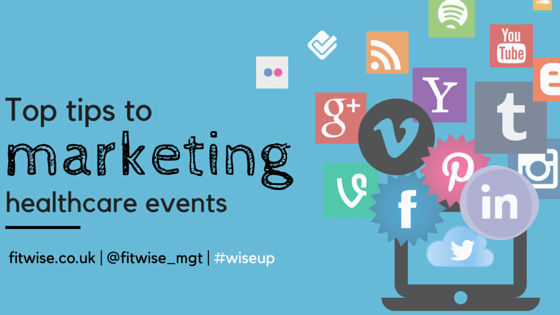
Welcome to our series of short ‘How to’ videos – ‘Wise up with Fitwise’, the first of which is a brief overview of Marketing Healthcare Events. All of our videos will be uploaded to our YouTube Channel and on the Video Page of our website.
We did the filming last year with our friends at ESW Solutions Ltd who have been editing the footage
for us since. This is the first time that any of us have been in front of a video camera and I know there is enough footage for several blooper reels. It was certainly a step outside our comfort zone and a challenge which I am proud of the team for taking on.
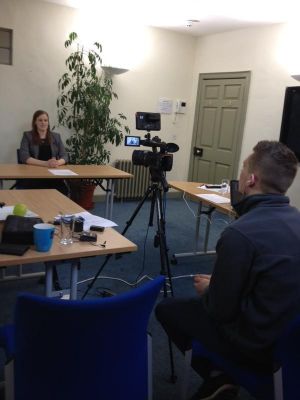
I hope you find our videos interesting, informative and they give you an insight into Healthcare Events, an area which we are passionate about making a success for our clients and their members.
We will bring you one video per month on all the different aspects of managing events. We will cover delegate management, speaker management, exhibition and sponsorship, abstracts, budgets… and much more. If there is anything you would like us to cover in the future, or if you have any questions let us know on twitter using the hashtag #wiseup.
Alongside each video we will also upload an accompanying blog post and condense this information into an infographic. We have been busy! We are excited to know what you think.
We will be sending out an email letting all our contacts know when each video is launched and if you would like to be added onto the mailing list please email Laura at marketing@fitwise.co.uk or fill out the form on the our Video Page.
Top Tips to Marketing Healthcare Events – An Overview
To view the video CLICK HERE
To view the infographic CLICK HERE
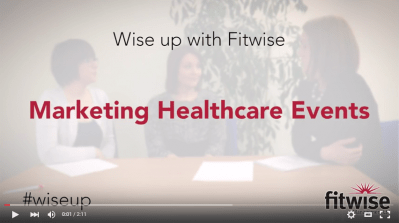
Here are some of our tips for marketing Healthcare Events on behalf of Associations.
- The marketing plan: A full marketing plan should be developed at the start of the conference planning process, and this should tie into the overall timeline of the event. All important dates should be incorporated into the marketing plan to ensure that the event promotion hinges round these dates, for example: abstract closing, bursary closing, early bird deadline, etc. By adhering to the marketing plan and timeline all the deadlines will be met.

The marketing plan will vary dependent on the event and the available budget, but fundamentally it should identify who the target audience is, what the objectives are for the event in terms of delegate numbers and type, and outline a coordinated communications mix to reach the targeted audience. This communications mix will vary dependent on the type of event and the available budget but can include: social media, emails, print advertising, online advertising, press releases, purchased mailing lists, contra deals, promotional items, etc.
- Launch events early: It is important to launch events as early as possible to ensure that delegates can get time off to attend, this is especially important for those who have clinics as their diaries can be booked up 6 months in advance. Generally speaking, for large annual conferences, delegate marketing should launch one year in advance, and for one-day events four month in advance. It is important to allow extra time over the summer holidays and Christmas as not a lot will happen in those months.

- The programme must be ready: The programme must be ready at the time the event is launched, delegates won’t be able to get time off work if they aren’t able to show Continued Professional Development. If you are looking to apply for CPD accreditation for the event, a full programme must be ready so that the application can be made and any accreditation should be advertised from the start of delegate marketing.
- Free events: It is getting harder for those from the NHS to attend events, both getting time off and getting funding to attend is extremely difficult. Therefore, if you can, make the event free to attend you are removing one of the barriers to attendance. It may be that by making the event free you can secure additional delegates which will in turn attract additional sponsorship / exhibitors which will means that the event shouldn’t lose income.
- Contra Deals: If you don’t have a lot of budget to spend on promotion, mutually beneficial contra deals are an excellent way of securing publicity. For example, a magazine may be happy to feature a conference advert in return for a stand at your event or display materials.
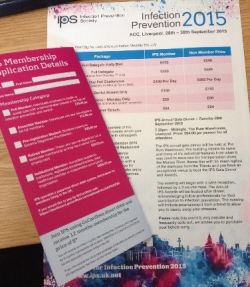
- Members Rate: For paid for conferences, it can be particularly successful if the members’ rate plus membership is lower or the same price as the non-members rate. The revenues gained would therefore be across membership and conference. Typically, we have found that a standard membership term is approximately 5 years.
- Surveys: After the event it is extremely useful to survey both the delegates and exhibitors, not only to identify areas of improvement but the statistics from the surveys can be used within future marketing material.
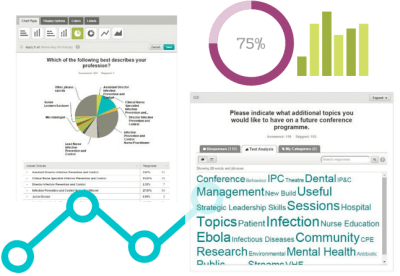
Let us know what you think! Follow us on Twitter and like us on Facebook and make sure to use the hashtag #Wiseup.
